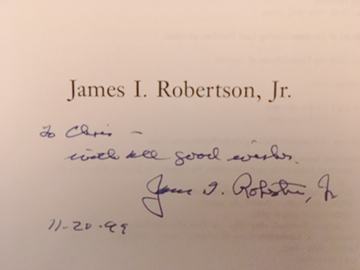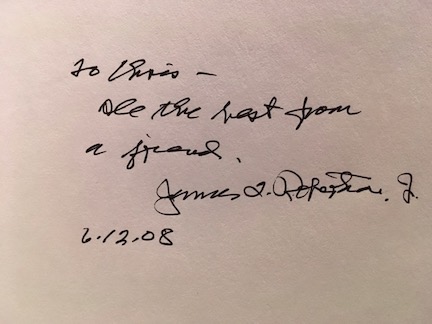Bud Robertson: In Memoriam (part two)
 On Thursday, Brian Matthew Jordan offered a few thoughts on the legacy of legendary historian James I. “Bud” Robertson, Jr., who died last weekend at the age of 89. Today, we hear from three more of our ECW historians—Bert Dunkerly, Chris Kolakowski, and Chris Mackowski—as they share their recollections.
On Thursday, Brian Matthew Jordan offered a few thoughts on the legacy of legendary historian James I. “Bud” Robertson, Jr., who died last weekend at the age of 89. Today, we hear from three more of our ECW historians—Bert Dunkerly, Chris Kolakowski, and Chris Mackowski—as they share their recollections.
Bert Dunkerly: Dr. Robertson was one of those iconic historians who has done so much for the field, who we all admired and relied on, and who we think will always be around. I did not know Dr. Robertson well, but he was always polite and professional with every interaction I had with him. He always took the time to speak with me, and was willing to do presentations when I asked. He saw the good in everybody, and saw history as a means to do justice to the people of the past. Dr. Robertson made us pause and think, and consider new things. He showed us the humanity of our ancestors, he cared about education, and he cared about preservation. As a community of historians we are better off for knowing him.
Chris Kolakowski, ECW’s Chief Historian: Dr. James I. Robertson—“Bud” to his friends and colleagues—left a towering legacy to Civil War history. He straddled both academia and public history through his work at the Centennial Commission and later Virginia Tech, while his books were well-received and well-respected. Bud and I spoke at conferences together several times, and while we may not have always agreed, there was a strong mutual respect. He was a strong voice for history and preservation, and I shall miss him.
Chris Mackowsk, ECW’s Editor-in-Chief: I first met Bud twenty years ago this month, as it happens. At the time, I was little more than a Stonewall Jackson fanboy, brought into the study of the Civil War by my young daughter’s interest in Jackson. Bud’s monumental biography of Jackson was a landmark for me (I’ve read it through twice and have referred to it for research countless times).
I had seen Bud on TV, of course, so when I had the chance to finally hear him speak in person, at the Smithsonian, I drove the five-and-a-half hours from western New York to Washington D.C. He spun yarn after yarn in a day-long series of lectures, captivating and charming. He not only knew his subject matter intimately, but he obviously loved talking about it and sharing.
Over the years, as I got into Civil War history more seriously, Bud and I got to know each other a bit on a professional level. He was a rock star, complete with groupies, yet he always comported himself with friendly dignity—the model “gentleman and a scholar” if ever one existed.
His powers as a storyteller, like good wine, only got better with age. On the Roundtable circuit, I constantly heard tales from Bud’s amazed and adoring fans. As a speaker, he set the bar for all who followed—a bar that often came with descriptions like “standing ovation” and “record audience” and “most popular ever.”
We spoke together on the same bill only once. He sat in the front row, respectful and attentive, as I talked about Ulysses S. Grant. He would occasionally give a small nod or a smile as I made some point or another. I felt like a student again, eager for a favorite professor’s approval.
Last spring, I extended to Bud an invitation from my ECW colleagues to speak at our upcoming Symposium. “I am truly honored,” he replied—but added his regrets. “I have been waging a mighty war with cancer,” he told me. “All indications at the moment are that I am winning the contest.” But, considering “the uncertainties of the future,” he felt it best that he not make a commitment he might have to cancel. “So let me step back,” he said, “and I do so with every good wish for the success of the 2020 program.”
As a Civil War community, we’re fortunate that Bud left such a rich body of work—not just his books but his Civil War Journal episodes, his radio commentaries, and his other media appearances. He did so much to help generations of people—students, buffs, and the general public alike—connect with America’s great story.

I am one of thousands who took his extraordinary two part Civil War course at Virginia Tech and later followed his extensive career, read all his books and particularly enjoyed his vivid descriptions of Lee’s bad old man Jubal Early.